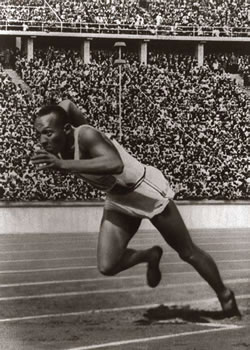Examining the Intersection of Race, Politics, and Sports
May 3, 2010
When Mason professor David K. Wiggins talks passionately about the intersection of race, nationalism, and politics, it is sometimes difficult to believe he is discussing sports. In this particular case, he is speaking about the 1936 Berlin Summer Olympics, often called the "Nazi Olympics," a topic about which Wiggins has written extensively.
Wiggins has spent his career chronicling the achievements and struggles of African American athletes. Recently, he served as a historical advisor to the U.S. Holocaust Museum in Washington, D.C., for an exhibit on the 1936 Olympics.

David K. Wiggins
"The great thing about [these games] was the symbolic nature of it all," he says. "Hitler and his Nazi regime were talking about Aryan racial superiority, and you had Jesse Owens and all those African American athletes competing and winning. It was quite extraordinary in that respect."
Wiggins and several historians from around the country met with museum staff early in the process. "The staff picked our brains and asked us what we thought should be in the exhibit," he says. "They wanted the exhibit to be as historically accurate as possible. They also wanted to know some of the mythology about the games."
It was important to Wiggins that the exhibit include other African American athletes in addition to Jesse Owens, the American track and field superstar who achieved international fame and took home four gold medals from those Olympic games.
"There is a tendency for people to think about Owens first, but we had a large African American contingent, 16 men and 2 women, at that Olympics who not only participated, but were very successful. You don't often read about those people," he says.
In fact, Wiggins discovered while still in graduate school that there just wasn't much scholarly material written about African American athletes in general. It was this gap in the literature that inspired Wiggins and helped him find his scholarly niche.
"It was the early 1970s. Historians were beginning to pay attention to the underrepresented and the common man," says Wiggins of his time studying sport history at the University of Maryland. "There was a keen interest in African Americans, their role in American society, and what they had gone through."
Over the years, Wiggins, who also is director of the School of Recreation, Health, and Tourism (RHT) at Mason, has written a number of books about African American athletes, including Glory Bound: Black Athletes in a White America and The Unlevel Playing Field: A Documentary History of the African American Experience in Sport (with Patrick B. Miller).
"Colleagues have commented that [my area of expertise] is so narrowly conceived, but I always argue it isn't," he says. "When you look at the studies I've done, it is really quite diverse."
The historical debate over black athletic superiority, the campaign to include blacks in organized baseball, the 1968 Mexico City Olympics and the black power protests, and Muhammad Ali and the Nation of Islam are among his research topics.

American athlete Jesse Owens achieved international fame by winning four gold medals at the 1936 Berlin Olympics.
Many people remember American sports commentator Jimmy "the Greek" Snyder's infamous remark about the superiority of black athletes that got him fired from CBS in 1988. Wiggins has written about the debate, which he calls a myth, and maintains that there is no scientific evidence to support the claim. But the question remains, why are black athletes dominant in certain sports and underrepresented in others?
According to Wiggins, this has more to do with participation patterns, which are in turn influenced by economic factors. "African Americans have traditionally not enjoyed equal cultural and socioeconomic opportunities. Lacking money and access to certain equipment and facilities has guaranteed that the African American athlete focuses his or her attention on certain sports and not on others."
In addition, young athletes who want to follow in the footsteps of their sport icons contribute to the participation patterns.
Wiggins is in the process of editing a second volume of his 1995 book, Sport in America: From Wicked Amusement to National Obsession. He also is editing with RHT colleague Pierre Rodgers a collection of essays on sport rivalries. Some of the rivalries covered in the book will include Larry Bird and Magic Johnson, Muhammad Ali and Joe Frazier, and the Ohio State University and the University of Michigan.
"I have always been fascinated by rivalries and how people get so immersed in them, how people identify with certain people on certain teams," he says.
Although the 1936 Olympics exhibit is no longer on display at the U.S. Holocaust Museum, an online version is available on the museum's web site. "The 1936 Olympics did raise consciousness here at home. In defending Germany's right to host the games, the Nazi press raised the issue of American racism to embarrass the United States in the eyes of the world," he says. "It made thoughtful whites painfully aware of the contradiction in opposing Nazi racial philosophy while doing nothing about racism at home."
—Colleen Kearney Rich
